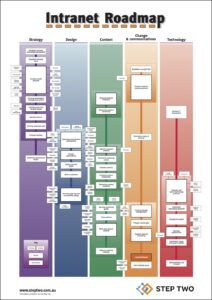
Writing on checklist from Shutterstock
Filed under: Articles, Content management, Intranets
One of the greatest challenges confronting intranets is ensuring that content is up-to-date, accurate and useful. In many organisations, much thought and effort is put into maintaining (and enhancing) the quality of published content.
What must be realised, however, is that not all content on an intranet needs to be of equal quality. Only once this is recognised can successful strategies be put in place to support content authoring and publishing.
Attempting to deliver good content
Most intranets struggle to deliver consistent, up-to-date and useful content. In many cases, the overall content of the site is poor, impacting on staff trust and usage levels.
Confronted by these problems, intranet teams often look to implement a range of activities to improve content quality.
These may involve:
- establishing writing guidelines and policies
- implementing standard templates and frameworks
- requiring compliance to these standards by distributed authors
- establishing review or workflow rules
- promoting the importance of ‘good’ content
- conducting training for authors
While these activities can certainly be beneficial, they are often applied equally to all authors, and to all content.
When applied in this ‘broad brush’ way, these initiatives often have only limited impact, and may encounter resistance (or disinterest) from authors.
There is a very real cost in delivering high quality content, in terms of writing and reviewing content, as well as in maintaining the standard and processes that underpin the publishing process.
Not all content, however, needs to be of a high quality. A much better outcome is obtained by targeting efforts on the most important content, while applying lower standards to other intranet writing.
High quality content
Some intranet content needs to be written to a very high standard. This includes key resources for staff, and core corporate information, such as:
- corporate policies and procedures
- front-line support materials (such as in call centres)
- corporate communications
These materials must be very accurate, carefully written and well structured. They must also be kept up to date, in sync with underlying organisational or legislative changes.
In these situations, consider centralising the writing of this material. There is also a strong argument for employing professional writers to produce or edit this material, working in close collaboration with subject matter experts.
Sufficient resources should be allocated to the creation and maintenance of this content, to ensure that the content is useful for staff.
Lower quality content
Beyond core corporate information, intranets contain a wide variety of material that does not need to meet the same exacting quality standards.
At one extreme, content such as project updates or meeting minutes can be of a quite low quality. In these situations, it is more important to have this information published in a timely way, rather than to have it written well (or even spelled correctly!).
Other content will need to be of a higher standard, but still not to a level required for core corporate documents.
For this broader content, a decentralised authoring model will be required. Ensure that publishing standards and policies do not place too many roadblocks, or make it too hard for authors to quickly publish required content.
Decentralised authors should then be given greater freedom to publish content to a standard that meets the needs (and expectations) of their individual audiences.





